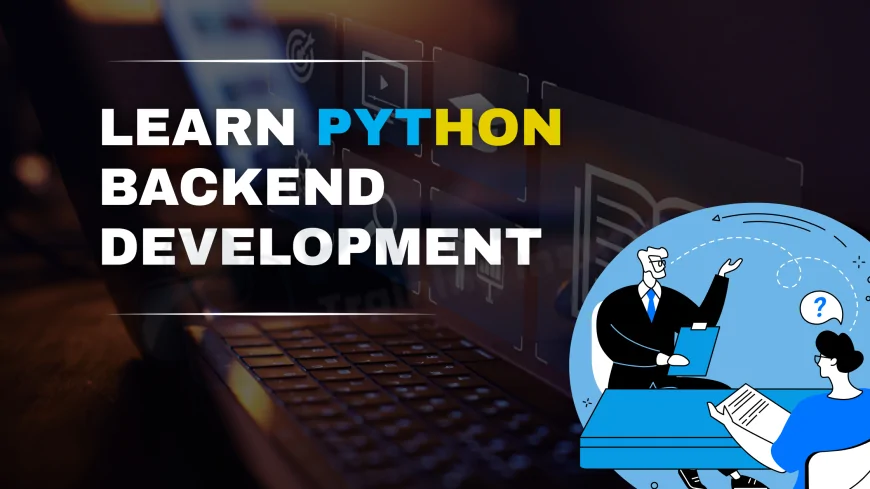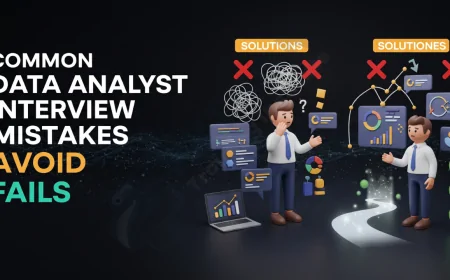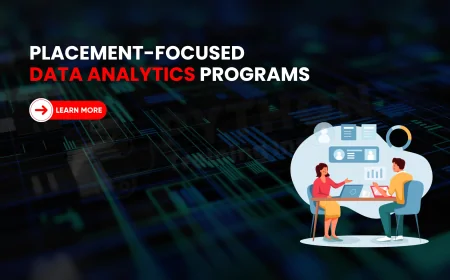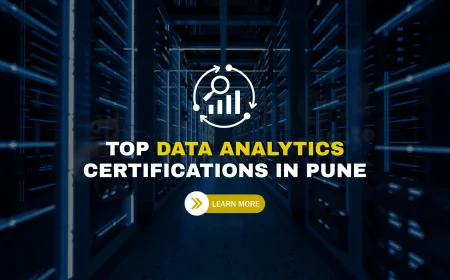Top Online Python Backend Development Courses for 2025
Discover the best online Python backend development courses to master frameworks like Django and Flask. Learn backend programming from scratch, build real-world projects, and boost your tech career with flexible, expert-led training.

Python has become a dominant language in backend development due to its simplicity, readability, and vast ecosystem of frameworks and libraries. Whether you're a beginner or an experienced developer looking to enhance your backend skills, numerous online classes can guide you through the journey. This blog delves into some of the best online classes for Python backend development, highlighting their unique features and benefits.
1. Comprehensive Backend Development Bootcamps
For those seeking an all-encompassing learning experience, comprehensive bootcamps offer structured curricula covering Python fundamentals to advanced backend concepts.
Key Features:
-
Structured Curriculum: Covers Python basics, object-oriented programming, and advanced topics like Django and Flask frameworks.
-
Hands-On Projects: Real-world projects to apply learned concepts.
-
Community Support: Access to forums and peer discussions for collaborative learning.
These bootcamps are ideal for learners who prefer a guided path with a mix of theoretical and practical knowledge.
2. Framework-Specific Courses
If you're interested in mastering specific Python frameworks like Django or Flask, several courses focus exclusively on these technologies.
Django-Focused Courses:
-
In-Depth Coverage: From setting up Django projects to deploying them on servers.
-
RESTful APIs: Building APIs using Django REST Framework.
-
Authentication Systems: Implementing user authentication and authorization.
Flask-Focused Courses:
-
Microservices Architecture: Understanding and building microservices with Flask.
-
Database Integration: Connecting Flask applications to databases like PostgreSQL or MongoDB.
-
Deployment: Deploying Flask applications using platforms like Heroku or Docker.
These courses are suitable for developers aiming to specialize in a particular framework, providing deep dives into their functionalities and best practices.
3. Project-Based Learning Platforms
Learning by doing is an effective approach, and project-based courses emphasize building real-world applications.
Benefits:
-
Practical Experience: Develop applications like blogs, e-commerce sites, or chat applications.
-
Problem-Solving Skills: Encounter and resolve real-world challenges during development.
-
Portfolio Development: Create a portfolio of projects to showcase to potential employers.
These platforms are excellent for learners who prefer hands-on experience and wish to build tangible projects.
4. Free Resources and Tutorials
Budget constraints shouldn't hinder learning. Numerous free resources provide quality education in Python backend development.
Notable Features:
-
Comprehensive Content: Covers a wide range of topics from basics to advanced concepts.
-
Community Engagement: Forums and discussion boards for doubt resolution.
-
Flexible Learning: Self-paced tutorials to fit individual schedules.
These resources are perfect for self-motivated learners seeking cost-effective learning options.
5. Specialized Backend Development Courses
For those looking to delve deeper into backend development, specialized courses focus on advanced topics and industry best practices.
Course Highlights:
-
Advanced Concepts: Topics like asynchronous programming, caching, and scalability.
-
Tool Integration: Using tools like Celery for task queues and Redis for caching.
-
Performance Optimization: Techniques to enhance application performance and reliability.
These courses are tailored for developers aiming to refine their backend skills and stay updated with industry trends.
6. Full-Stack Development Courses with Backend Emphasis
Understanding the full stack provides a holistic view of application development. Some courses offer full-stack training with a strong focus on backend development.
Learning Outcomes:
-
Frontend Basics: Introduction to HTML, CSS, and JavaScript.
-
Backend Mastery: In-depth training in Python backend frameworks.
-
Integration Techniques: Connecting frontend and backend seamlessly.
These courses are ideal for developers who wish to understand the complete development cycle and enhance their versatility.
7. Self-Paced Learning Platforms
For learners who prefer flexibility, self-paced courses allow studying at one's own pace, accommodating different learning speeds and schedules.
Advantages:
-
Flexible Scheduling: Learn anytime, anywhere.
-
Customized Learning Paths: Focus on areas of interest or weakness.
-
Resource Availability: Access to a plethora of learning materials and exercises.
These platforms cater to individuals balancing learning with other commitments, offering a personalized learning experience.
8. Community and Mentorship Programs
Engaging with a community or having a mentor can significantly enhance the learning process.
Benefits:
-
Peer Learning: Exchange knowledge and experiences with fellow learners.
-
Mentorship: Guidance from experienced developers to navigate challenges.
-
Networking Opportunities: Connect with professionals and expand career prospects.
Participating in such programs fosters a supportive learning environment and opens doors to collaborative opportunities.
FAQ's
1. What makes online Python backend development courses popular in Pune?
Online Python backend courses are popular in Pune due to the city’s growing IT industry and demand for backend developers. Learners benefit from flexible scheduling, hands-on training, and access to job-ready projects, which align well with career goals in software development and engineering roles.
2. Are online Python backend classes in Pune suitable for beginners?
Yes, most Python backend classes online are beginner-friendly. They cover fundamental programming concepts before advancing to backend frameworks like Django and Flask. Institutes in Pune offer structured learning paths ideal for those starting their tech careers from scratch.
3. What are the career benefits of learning Python backend development?
Mastering Python backend development opens doors to roles like backend developer, API engineer, and full-stack developer. It also enhances your employability in startups and tech giants. Pune’s tech ecosystem offers abundant job opportunities for skilled Python backend professionals.
4. Do Pune-based Python training institutes offer placement support?
Many Python training institutes in Pune offer placement assistance, including mock interviews, resume building, and job referrals. Their industry tie-ups help learners get internships and full-time roles, especially in backend and full-stack development positions.
5. What frameworks are taught in Python backend development courses?
Common frameworks taught include Django, Flask, and FastAPI. These tools enable learners to build scalable backend systems and RESTful APIs. Pune-based courses often include hands-on projects using these frameworks to build real-world applications.
6. How long does it take to complete a Python backend course online?
Most Python backend courses online range from 8 weeks to 6 months, depending on intensity and content depth. Pune learners often prefer part-time formats that balance professional commitments with skill-building.
7. Is Python backend development in demand in Pune's job market?
Yes, Python backend development is in high demand across Pune’s IT firms, fintech companies, and startups. Employers seek developers skilled in Django, REST APIs, and cloud deployment to build scalable web services.
8. What is the average salary after completing a Python backend course in Pune?
Entry-level Python backend developers in Pune can earn ₹3.5L to ₹6L annually, while experienced professionals may earn over ₹10L. Salary varies by skill level, project experience, and job role.
9. Can I learn backend development using only Python?
Absolutely. Python offers a robust ecosystem for backend development through Django, Flask, and other tools. Courses in Pune often teach Python-exclusive backend stacks, enabling learners to develop full-featured web apps.
10. Do Python backend classes in Pune include live projects?
Yes, top online Python backend classes offer live projects such as blog engines, e-commerce backends, and RESTful API services. These projects enhance your portfolio and demonstrate practical backend skills to employers.
11. What prerequisites are needed for Python backend development courses?
Basic knowledge of Python syntax is helpful but not mandatory. Most courses start with programming fundamentals and gradually move into backend architecture, making them accessible to beginners in Pune.
12. Are certificates from online Python backend courses recognized by employers in Pune?
Certificates from reputed training institutes are valued by Pune employers, especially when backed by hands-on project work and a strong GitHub portfolio. While not equivalent to a degree, they demonstrate skill readiness.
13. How are online Python backend classes conducted in Pune?
These classes typically use Zoom, Google Meet, or learning platforms. Sessions include live instruction, recorded videos, assignments, and Q&A forums. Learners in Pune benefit from both real-time and self-paced study options.
14. Which backend topics are covered in Python training?
Key backend topics include request handling, database integration (MySQL, PostgreSQL), REST API creation, authentication, and deployment using cloud services. Pune-based courses ensure comprehensive backend coverage with Python.
15. What types of assessments are included in Python backend courses?
Assessments include coding challenges, quizzes, project submissions, and real-world use case implementations. Pune training centers often include periodic evaluations to track progress and build confidence for job interviews.
16. Can Python backend classes help transition into full-stack development?
Yes. Many Python backend courses also introduce frontend basics like HTML, CSS, and JavaScript, making them ideal for learners aiming to become full-stack developers. Pune’s tech companies often prefer versatile developers.
17. What are some common projects included in backend development training?
Common projects include blog platforms, e-commerce backends, user authentication systems, API integrations, and CRUD applications. These projects build strong portfolios for Python backend job applications in Pune.
18. Is mentorship included in Python backend courses in Pune?
Yes, many online training programs include mentorship from experienced developers. This helps learners in Pune receive personalized guidance, industry insights, and career advice throughout their learning journey.
19. How do I choose the right online Python backend course in Pune?
Evaluate the curriculum, project opportunities, instructor credentials, placement support, and alumni reviews. Look for courses with structured modules on Django, API design, and real-world applications relevant to Pune’s job market.
20. Are online Python backend development courses better than offline ones in Pune?
Online courses offer flexibility, access to recorded content, and global mentorship—ideal for working professionals and students. Pune learners appreciate the convenience of online formats combined with job-ready training.
Key Takeaways
Embarking on the journey to master Python backend development is both exciting and rewarding. With a plethora of online classes available, learners can choose courses that align with their learning styles, goals, and schedules. Whether it's comprehensive bootcamps, framework-specific courses, or self-paced tutorials, the key is consistent practice and application of knowledge. Embrace the learning process, build projects, engage with communities, and stay updated with industry trends to excel in Python backend development.
What's Your Reaction?
 Like
0
Like
0
 Dislike
0
Dislike
0
 Love
0
Love
0
 Funny
0
Funny
0
 Angry
0
Angry
0
 Sad
0
Sad
0
 Wow
0
Wow
0















